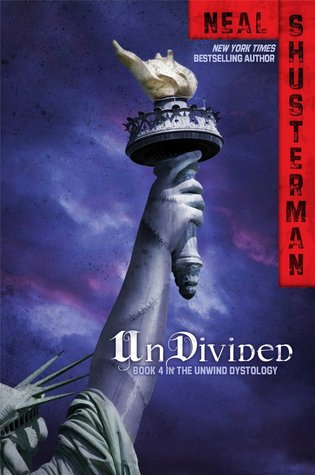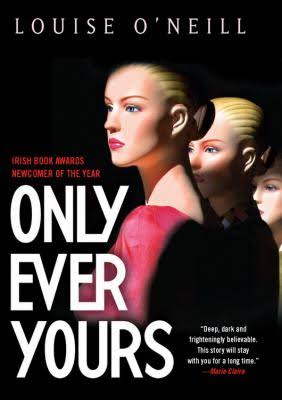
I’m ambivalent about the Unwind series. It contains an interesting dystopia concept and plenty of political and medical criticism, but it’s far from being a perfect book. Actually, several parts felt like hiccups, so acutely off rhythm that you can’t help but notice them. Unwind struggles with character development and maintaining a propelling plot. While the series is interesting, the peculiar plot choices and the passivity of the female characters makes me reluctant in fully recommending this series, even though books one and four are definitely worth a read.
Unlike part one, the following comments below contain spoilers:
That Creepy, Creeeeeeeepy Scene:
What happens when someone is unwind? Many theories get tossed around about this one with everyone choosing to believe that a person is sedated and then put to sleep. If only.
Patients are awake during the unwinding operation! While the patients are sedated, they simply watch as every part of them is harvested, like Hannibal Lector eating your brain while you’re awake. How is this kind of operation possible? Well, science—I guess.
Unlike others, I wasn’t at all prepared for this passage. After reading it, I had to put the book down to process. Unwind isn’t known for its writing, but this particular passage illustrating a teenager’s unwinding is truly one of the most disturbing things I’ve read in a while.
Like, OMG! Girls Chasing Boys! Like. OMG. Girls Chasing Boys?
Risa Ward is smart. She knows fighting is a last resort. Connor quickly picks this up too, allowing him to become the leader of the Graveyard and later represent the ideas of the unwinding resistance movement. Connor matures, as he should, but instead of Connor adopting Risa’s resourcefulness, which would add to their dynamic duo, Connor subsumes her role as the team’s strategist while being leader, but Risa is sidelined as the helpless, stuck in yet another love triangle, girlfriend; her being belongs to everyone but her own.
Unwind robs not only Risa of potential badassery, but many of the other female characters, most who remain in supportive and/or love interest roles:
- Miracolina; Lev’s love interest.
Although she has all the workings to be this tenacious force in the series (she’s arguably far more committed to her own convictions than Risa), she doesn’t stay in the rotating cast of character for very long. She’s actually the only third-person narrator to drop out of the series. We see her at the end just in time for her to start a long-distance relationship with Lev–because this is what every girl wants after pining for a guy for supposedly two years.
- Bam (Bambi): She’s in love with Starkey.
Unlike the other girls in the story, Bam’s happy ending doesn’t involve ending up with anyone. She’s Starkey’s second in command and also secretly in love with Starkey. Only when Bam discovers Starkey’s secret harem does she decide to stage a mutiny against Starkey—but she has to have help. Hayden is the brains of the operation and orchestrates the entire kidnapping (and dumping) of Starkey. She’s been Starkey’s second in command for months and a leader in her own right, but she had to go to Hayden for a plan, which wasn’t even a complicated one: drug everyone including Starkey, drop him in the middle of nowhere, and relocate the Stork troops while Starkey’s out cold. She apparently had to go to him.
Every girl has a romantic partner. Even Una, who tragically lost her fiancé, ends up finding love in a guy that has her deceased fiancé’s hand—and I wish I were kidding
Unwind ascribes stagnant roles to women that only draw emphasis to the male characters. Every significant step forward is made by a man. Connor takes down the flying harvest factory. Lev sacrifices himself on national television, waking people up to the issues of unwinding. Let’s not forget that Risa also was on television two years earlier, outing the corruption of Proactive Citizenry, but no one paid attention to this apparently.
This is a story about people being treated as just a bunch of parts, which subsequently is how the story treats its female characters. The Unwind series represents only a singular, if not poor, interpretation of women.
Change Takes Time
Unwind’s ending delivers promise to a better world. Because of Lev’s stunt—faking a terrorist-clapper bombing so people would shoot him dead—makes the world reexamine the moral consequences of unwinding teenagers.
When Connor, having been rewound, shows up in Washington ready to diplomatically fight the problem, it shows just the beginning of the solution. Rebuilding. Reconstruction. Proper Representation. Laws. These are things that were introduced and make the ending somewhat satisfying.
Overall, Unwind had its entertaining moments, and made sure everyone in the end got what they ‘deserved,’ but it falls to pieces in its plot and character departments. Although not a well-known series, Unwind does belong on someone’s shelf of dark dystopia, but it is, perhaps, too ‘morbid’for some too read.
Blogger Note:
So sorry for the infrequent posting. To say the least, a number of issues have marred me in the last couple months: Lows, online class, sickness, and horrrrrible reading dry spells. The good news? Online class shall soon end, the sickness is going away, and OMG, I’ve got my reading groove back! Yay! I should be back to posting regularly soon.


 Chick lit needs to go away.
Chick lit needs to go away. Only a handful of books make me tremble and cringe and Louise O’Neill’s Only Ever Yours is now one of them. Compared to Margaret Atwood’s The Handmaid’s Tale, Only Ever Yours is a YA dystopian novel about the subjugation of women, their sexuality, and their identity. The women are toxic, undermining, manipulative, narcissistic, insecure, and superficial and that’s only because they were designed this way and are otherwise known as eves—capitalization omitted intentionally. They’re artificially designed women since women are no longer born naturally. Yours feels unending of depravity and acerbic dialogue, with danger and destruction festering like a tumor, but it’s praiseworthy, evocative literature about femininity and gender inequality, nonetheless
Only a handful of books make me tremble and cringe and Louise O’Neill’s Only Ever Yours is now one of them. Compared to Margaret Atwood’s The Handmaid’s Tale, Only Ever Yours is a YA dystopian novel about the subjugation of women, their sexuality, and their identity. The women are toxic, undermining, manipulative, narcissistic, insecure, and superficial and that’s only because they were designed this way and are otherwise known as eves—capitalization omitted intentionally. They’re artificially designed women since women are no longer born naturally. Yours feels unending of depravity and acerbic dialogue, with danger and destruction festering like a tumor, but it’s praiseworthy, evocative literature about femininity and gender inequality, nonetheless
